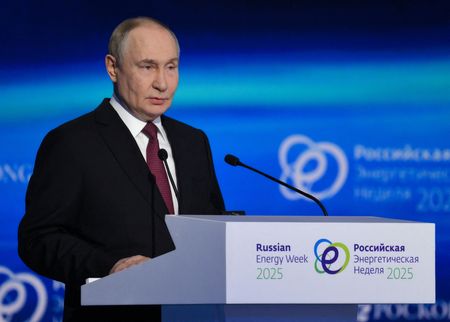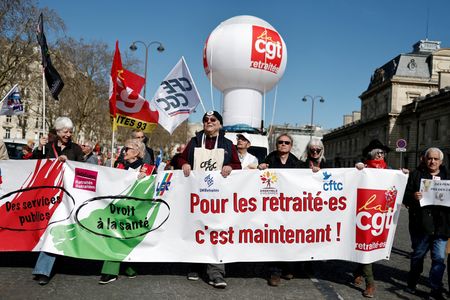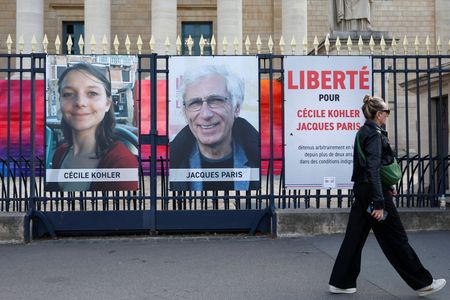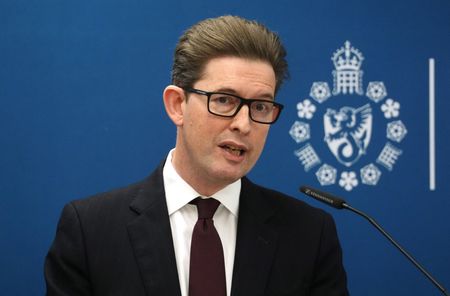MOSCOW (Reuters) – President Vladimir Putin gave the keynote address at Russian Energy Week 2025 in Moscow.
Here are some of the main parts of his speech. He spoke in Russian and his words were translated by Reuters.
ON FUTURE OF OIL MARKET:
“According to estimates, global oil demand this year will amount to 104.5 million barrels per day, more than a million more than last year. The main factors driving consumption growth are the active development of the petrochemical industry, which is growing faster than global GDP, as well as the transport sector, where many plans to phase out internal combustion engines are being pushed back. People use gasoline-powered cars and they will continue to do so.”
ON RUSSIAN OIL SECTOR:
“Russia maintains its position as a leading oil producer, despite unfair competition being used against us.”
“We account for approximately 10% of global production and expect to produce 510 million tons of oil by the end of the year. This is approximately 1% lower than last year. However, I would like to point out that this is in accordance with the OPEC+ agreement, meaning it is a voluntary reduction.”
“The Russian oil sector is operating reliably and is planning for the future. Our companies are not only reliably supplying the domestic market and developing oil refining, but, given the challenging external environment, they have demonstrated flexibility and have been able to establish new supply and payment channels. While previously our oil and petroleum product exports were primarily focused on one consumer, the European Union, now the geography is much broader.”
ON OPEC+:
“Russia continues to cooperate within OPEC+. Based on mutual interests, we and our partners are fulfilling our obligations to balance the global market. I would like to point out that this is being done not only for producers but also for consumers. Our joint efforts are yielding results. I’m primarily referring to supply volumes on the market and the pricing environment.”
“These parameters satisfy both oil producers and consumers, allow the industry to launch investment projects, and, most importantly, provide conditions for more predictable development of the entire global economy.”
“Predictability in the oil market is perhaps the most important thing in this sector of the global economy.”
ON GAS SECTOR:
“It would seem that the refusal of some European countries to accept Russian gas and the disruption of the well-known Nord Stream pipeline have cut us off from traditional markets and dealt a blow to a crucial sector of our fuel and energy complex. And it must be acknowledged that our gas exports did initially decline, but then began to grow again. They haven’t fully recovered yet, but the growth is absolutely clear. The EU’s move has only accelerated the shift in our supply vector in favour of more promising, responsible buyers – countries that understand their own interests and act rationally, based on those national interests.”
ON COAL SECTOR:
“Despite the negative forecasts of some experts, coal still accounts for a significant share of the global energy balance. However, there are clear regional differences. While Western markets are reducing demand for coal, Asian countries are increasing consumption.”
“Clearly, the issue is primarily one of the economic efficiency of coal generation, but given the shift in global business activity to the Asia-Pacific region, we can expect the coal market to remain significant and large for decades to come.”
“Yes, like any market, it is cyclical, and coal producers are currently facing declining prices. In these circumstances, we are supporting our companies and workforces, including by restructuring loans.”
ON NUCLEAR ENERGY:
“Our other high-tech leader, Rosatom, also has significant experience. It accounts for approximately 90% of the global nuclear power plant construction market… 110 power units of Russian design have been built worldwide. Russia is unique in the world in possessing expertise across the entire nuclear energy chain.”
“Building on this foundation, we’re constructing nuclear power plants in Egypt, Bangladesh, and Turkey, and we intend to deepen cooperation in the nuclear industry with countries of the Global South through BRICS.”
(Reporting by Reuters, Compiled by Felix Light; Editing by Andrew Osborn and Mark Trevelyan)











